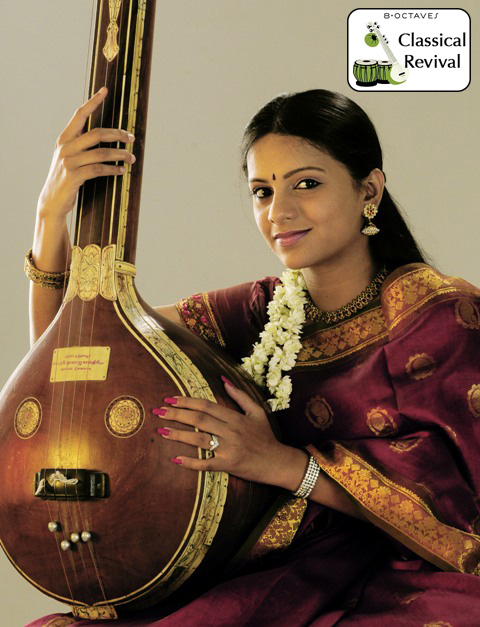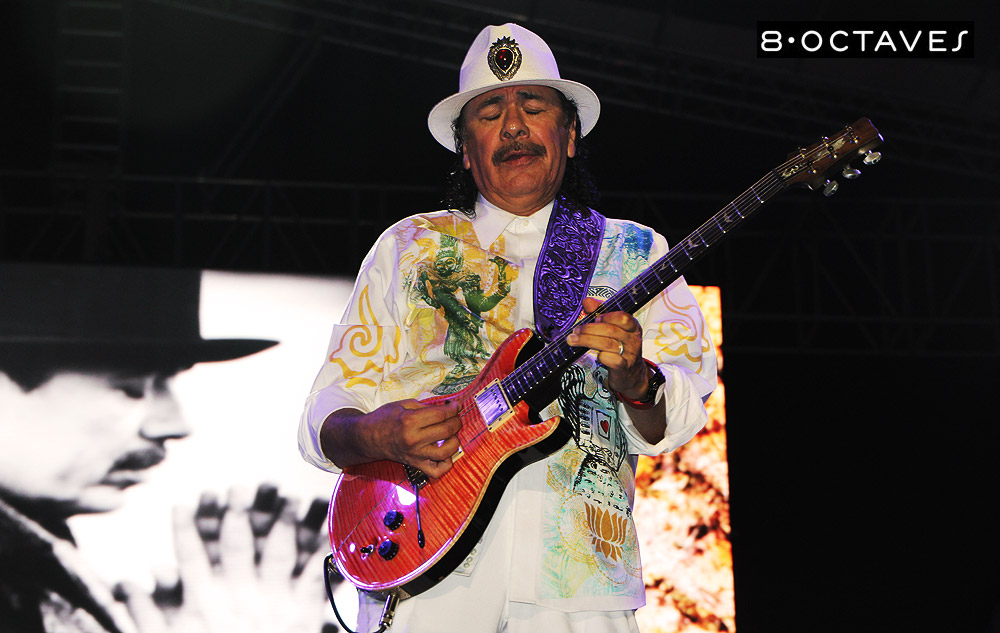Heading towards bagging all the prime slots in the Sabhas, Sri Ranjani Santhanagopalan is making a mark Carnatic music scenario today. Guided by her father Neyveli.Sri.R.Santhanagopalan, she holds a consistent record of well-received concerts. Sriranjani has been chosen to receive FOUR awards for the year 2012-”Yuva Kala Bharati” from Bharat Kalachar, “M.S. Subbulakshmi” award from Narada Gana Sabha,”D.K.Pattammal” Award from Karthik Fine Arts and “M.L.Vasanthakumari” award from Parthasarathy Swami Sabha.
Eight Octaves: You are definitely one of the most promising artistes in
the Carnatic music scenario today. Tell us how your musical journey began. Also share with us about your first stage performance experience.
SriRanjani: I think everyone around me started realizing that I had a flair for music from the very age of 4 when I used to sing varnams and small kritis without missing out on their nuances. I used to be able to identify most of the ragams at this tender age. Even though I did not pursue Canatic music seriously during my school days ,my life invariably revolved around music since my father is a great Carnatic musician.I gave my first concert when I was 17.The concert was held at my family friend’s house. I was unbelievably nervous, not only because it was my first concert but also because my father was in the front row. He was also equally nervous, I think because he kept whispering instructions to me throughout the concert :P. Even though it wasn’t a great concert ,it made me realize how much I love singing to an audience. That’s when I started pursuing Carnatic music seriously.
Eight Octaves: Considering you are the daughter of the legendary
Mr.Neyveli.Sri.R.Santhanagopalan,do you think there is a lot of pressure around you in terms of your performance? Personally, do you think a penchant for music has anything to do with genes or is it musician made?
SriRanjani: I’ve been asked this question repeatedly :D. All I can say is that I am very lucky to have such a great musician for a father. It enables me to learn for most part of my waking hours. Of course there is pressure in the sense that some expect me to match the Herculean standards that my father has set in carnatic music. But at this point, I feel that I should focus entirely on working hard and being a diligent student and the rest will follow automatically.I welcome well-meaning criticism from other people but for the most part, take the advice of my father/guru.
As for the gene factor, I am not qualified to make any scientific remarks but I do think that when you’re related to a musician, you grow up listening to music all the time. Unknowingly, you enjoy the benefits of the gurukula system of schooling, which I think is very special and great boost to becoming a good musician.
Eight Octaves: Our team congratulates you on winning the prestigious “Best vocalist” award from The Music Academy, Chennai for the year 2012. Where do you think this award has taken you in your career map?
SriRanjani: The Music Academy, Madras is one of the most prestigious Sabhas in the world. The Academy concerts are attended by almost all the rasikas and music connoisseurs alike and stays in everyone’s memory for a long time.2012 was my second year(during my first concertat the Academy, it was pouring down rain and there was hardly anyone in the auditorium) at the Academy and it felt great to win the “Outstanding vocalist” award. Ever since this award, I feel that more opportunities are coming my way.
Eight Octaves: How different is it to perform live and perform for a recorded show (TV)? Which do you enjoy more as a Carnatic singer?
SriRanjani: I think any performing artiste would enjoy a giving a live show against a recorded one. The reason is very simple -there is more freedom in live shows, which is the very essence of any performing art. Recorded shows come with time restrictions, implicit attention to tonal quality, resulting in repetitive recording which causes exhaustion. One of the biggest shortcomings of a studio recording is the absence of an audience. Without an audience to motivate you, you tend to sound mechanical or start to doubt the quality of your singing. But at the end of the day, it feels like it’s worth going through all this trouble since recordings are so useful in archiving and also in propogating this great art to the entire world.
Eight Octaves: How do you see the change in the ‘Kutcheri’ pattern in the recent times?
SriRanjani: Present day concerts come in tiny 1 1/2 hour , 2 hr capsules. Concerts in earlier days were more unhurried and some of them used to go on for as long as 7 to 8 hours. The time restriction in the present day concerts, I feel, has taken a toll on the manodharma(creativity) and the vishraanthi(leisure) aspects of music. But then my guru keeps telling me that if I’m not able to deliver the essence of a ragam in 5 minutes , I’m never going to be able to do it even if I sing for 5 hours.So I suppose all of us present day musicians are up against a great challenge 😀
Eight Octaves: Reminiscences about one special concert that touched your heart?
SriRanjani: All my father’s concerts are special.
Eight Octaves: You have given many concerts abroad and popularised Carnatic music.What kind of differences do you see in the audience responses within and outside India?
SriRanjani: The audience is the same everywhere in the world. They all attend concerts for the love of music. But here in India , due to poor transport facilities and other restrictions , people (especially the senior citizens) are not able to sit through the concerts. Also since there are so many concerts going on in India , especially Chennai, the audience get fractionated and as a result, most of the concerts are poorly attended.


Eight Octaves: Where do you see yourself in the next five years? Also any plans on experimenting into film music?
SriRanjani: As I mentioned earlier, my primary focus is on working hard and learn as much as I can before I become too much of a dunderhead 😀 I have the best guru in the world and his guidance is invaluable to me. Learning is all I have in mind right now. In the meanwhile, I shall strive hard to give my best in the concerts that I’m asked to perform. As my guru keeps reminding me-“When the art speaks for itself, glory will automatically follow”.
Eight Octaves: What were your practice methods? This may be a useful tip for youngsters.
SriRanjani:I start the day with yoga followed by akara practise. I spend the rest of the day learning new songs, revising old ones, listening to recordings or attending concerts. I would like to mention this. Each and every individual is bestowed with his/her own strengths and weaknesses and therefore there is no one method for practising music. Some techniques are common for everyone namely, morning practice,akara sadhakam, yoga etc. But otherwise, I feel that its best to follow your guru’s instructions and NOBODY ELSE’S. Seeking constant advice from others regarding practice methods can be very confusing and sometimes misleading.



